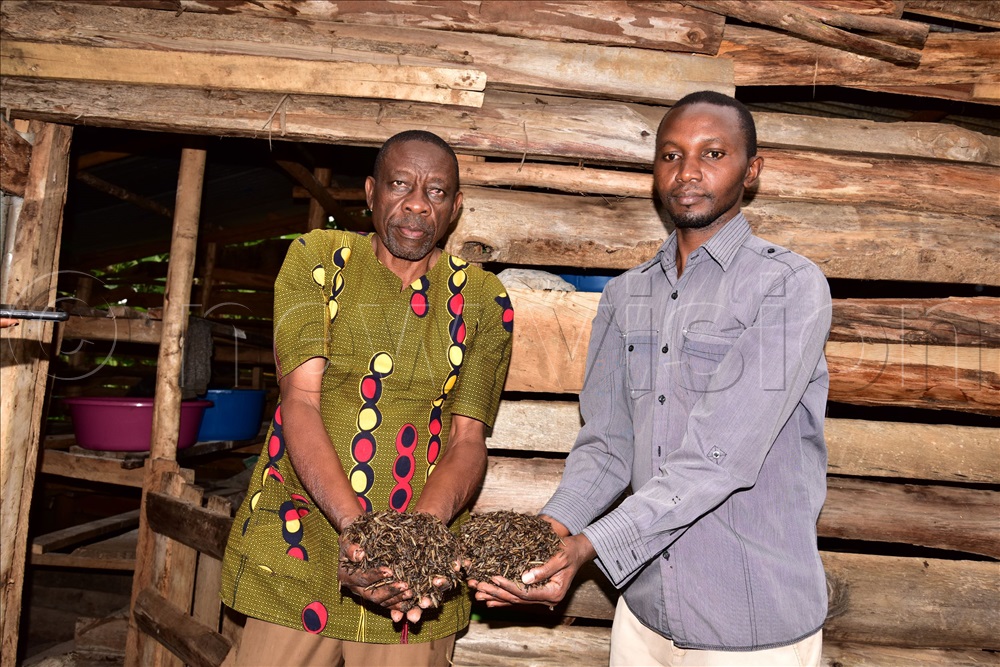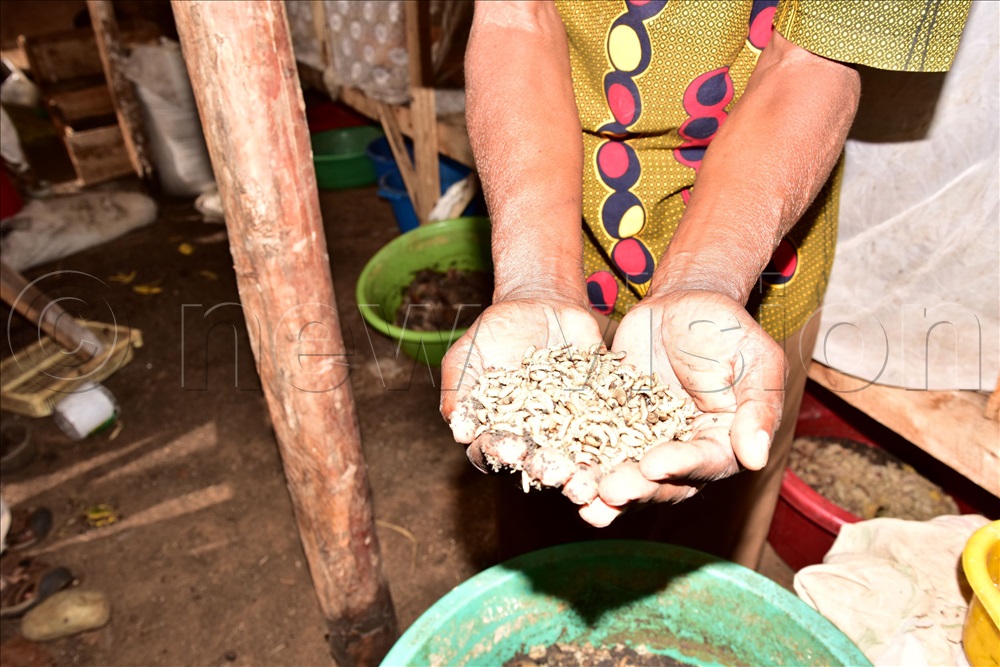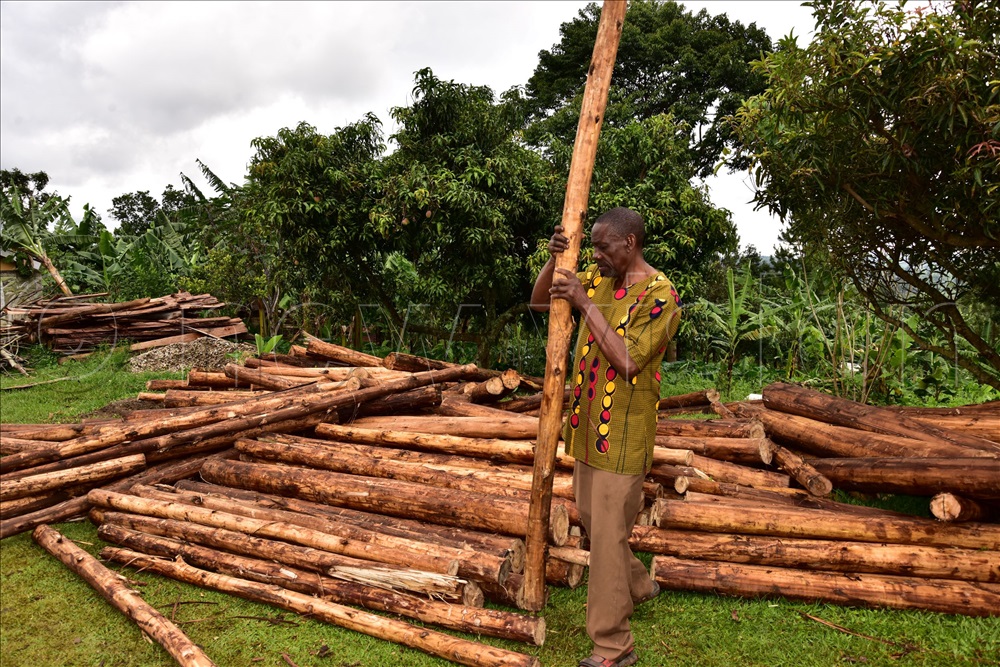By Umar Nsubuga
For the ninth year running, Vision Group, together with the Embassy of the Netherlands, KLM Airlines, dfcu Bank and Koudijs Animal Nutrition, is running the Best Farmers Competition. The 2024 competition runs from April to November, with the awards in December. Every week, Vision Group platforms will publish profiles of the farmers. Winners will walk away with sh150m and a fully paid-for trip to the Netherlands.
When 65-year-old Francis Tinkasimire tendered in his resignation at his workplace to take up large-scale farming, he was mocked and laughed at by some of his colleagues.
“I was 47 years old at the time. My colleagues found my decision weird and said I would die a poor and miserably man,” he recalls.
A forester by training, after his retirement in 2006, Tinkasimire went into full-time farming.

The bonus is that he was elected mayor of Robona town council in Kyabajwa village, Central ward parish in Bunyangabu district.
He is married to Gertrude Tinkasimire, with whom he has seven children.
Black soldier fly worms
Tinkasimire says this project is carried out in a greenhouse, which helps in controlling the temperatures.
He is also teaching other farmers about the same.
“The project starts from the larva and it has five stages — from instar one to instar five — but it’s the fifth stage which is most important because it has more concentration of nutrients,” he says.

Tinkasimire adds that at the larva stage, the worms eat whatever they can to ensure they have enough protein and fat to survive during the adult stage.
Egg production
Tinkasimire explains that the egg production unit consists of nets known as larva cages.
“These cages contain dishes with larvae and pupae, as well as sticks where the eggs are laid, referred to as ‘eggies,’” he says.
Tinkasimire adds that there are attractant dishes and water available inside the unit because the insects do not eat solid food. In the same greenhouse, there is an improvised incubator that maintains the necessary conditions for egg incubation. This is where the eggs are kept until they hatch.

Maintaining a constant temperature is crucial. After hatching, the larvae are moved to the nursery unit. At the third instar stage, it takes about eight days to transfer the larvae to the main waste, where they will feed for approximately 15 days.
Larva production
Tinkasimire says the larva production unit, the larvarium, has 100 basins. Each basin, after 15 days, can produce about 3kg of larvae from around 6kg of waste.
Once the food is fully consumed and converted into organic matter, larvae are harvested.
They are then washed and dried, either under the sun or with heat, and can be processed into powder for use in livestock feed.
Currently, he uses traditional drying methods but plans to build a solar dryer or acquire an oven.
“We use a clay pot for drying, which is not economical. After drying, we can pack the larvae in kilogrammes. One kilogramme of dried larvae goes for sh10,000. However, we require about 3kg of raw larvae to produce 1kg of the dried product,” Tinkasimire explains.
With access to waste and eggs, production is virtually unlimited.
He notes that while the initial investment in equipment such as basins and structures is significant, it is challenging to calculate precise profits.
Larva stage Pupae cost sh40,000. Once placed in the larva cage, the pupae eventually transform into adults. The adults lay eggs, which are transferred and maintained at optimal temperatures.
Proper temperature conditions ensure that the eggs develop into young larvae. At this stage, the young larvae are given ample food, typically sourced from household and market waste, including fruits, peelings, pineapples and watermelon.
“One challenge we face is the lack of a machine to crush the waste into smaller pieces,” Tinkasimire says.
The insect’s life cycle lasts about 40 to 50 days. The transition from eggs to larvae takes between two and three days, depending on the temperature.
Black soldier flies
Tinkasimire explains that black soldier flies are produced in a unit called the “love cage”.
Various elements in it facilitate egg production. Sticks are arranged together, serving as the site where black soldier flies lay their eggs.
Felix Bagonza, an expert at the farm, says these sticks are crucial because they provide a hiding place for the eggs.
Bagonza notes that black soldier flies tend to hide their eggs inside or near an attractant.
This attractant must have a strong or specific scent to draw the flies. Their instinct is to lay eggs where they sense food will be available for the offspring.
One black soldier fly can lay approximately 1,000 eggs before it dies. The male fly fertilises the female and also dies a few days later.
Tinkasimire says initially, they purchased pupae from Kampala at sh40,000 per kilogramme.
Challenges
Tinkasimire points says a solar dryer costs sh5m, which is quite expensive. This expense creates significant financial pressure, along with the challenge of sourcing protein for the larvae. Daily, one must find garbage to feed the larvae.
For large-scale operations, the initial investment is high. While small-scale farmers can manage, only a few can afford such a project.
Constructing a greenhouse, acquiring sticks and managing garbage collection is costly as well as challenging.
Additional needs include gloves, gumboots and dealing with middlemen, making it a less appealing job for those averse to messiness.
Garbage When discussing worms, Tinkasimire emphasises that food waste serves as their primary diet. It is crucial to record the date of each container used for food waste to track the period accurately.
Typically, larvae are harvested between 25 and 30 days after egg collection. From 25 to 30 days, larvae develop into pupae, and from 30 to 45 days, they transition into pre-pupae, which start to move.
As larvae turn into pre-pupae, they convert nutrients into the cocoon’s outer covering, which is primarily made of calcium. This calcium-rich cocoon is essential for the development of the pre-pupa into a mature adult, and the concentration of calcium in this stage is higher than in other commercial fields.
Impact
Tinkasimire currently employs three workers and has engaged 15 outgrowers to assist with insect production.
“I have a market for the insects, but the supply is still low. That’s why I’m involving other farmers to increase production,”
Starting the enterprise
Tinkasimire has frequently used failure on his farm to genuinely study the cause of the problem and find remedies.
He says during his final year as a government employee in 2006, he took a personal initiative to study how to make profits from farming. The findings pointed him towards black soldier fly farming, winemaking and tree planting.
Tinkasimire planted eucalyptus trees and bananas on over 10 acres. Last year, Tinkasimire started a worm farming project and wine-making.
“My vision has come true. I have no regrets and have never failed to deliver orders for my produce,” he says.
Conservation practices
Tinkasimire is committed to environmental conservation through tree planting.
“The more trees we plant, the better we contribute to environmental conservation,” he says.
Tinkasimire has dug trenches across the orchards and planted various trees within the banana plantations.
Tinkasimire views trees as a major future income source. His land is dotted with trees, including over 10 acres of eucalyptus.
He sells three to four-year-old eucalyptus trees to support his farm and continues to plant more. His goal is to eventually rely on income from his trees in his later years.
Other enterprises
Wine-making: Last year, Tinkasimire began researching about wine production.
He attended workshops organised for farmers in Kasese district and Fort Portal, aiming to add value to his matooke. By processing matooke into juice and wine, he seeks to enhance its value rather than selling it raw.
Tinkasimire has been growing matooke for over 10 years and has observed fluctuating prices.
He believes that adding value to the produce could stabilise prices and increase farmers’ earnings. For wine production, he specifies the number of cloves and water, then adds yeast and preservatives.
The mixture ferments for no less than three months. From 20kg of matooke and 20ltrs of water, he produces one jerrycan of wine. This wine can be sold for at least sh150,000.
Additional sugar and preservatives are used to improve the product.
While local sales are common, Tinkasimire is working towards obtaining the Uganda National Bureau of Standards certification for broader market access.
Since starting wine production, Tinkasimire has encouraged other farmers to try wine-making alongside their existing projects.
Banana plantation: Tinkasimire’s banana plantation covers three acres, and he sells over 20 bunches of matooke every three weeks.
A fourth acre has just begun flowering. His innovative practices enhance the plantation’s productivity.
To boost production, he uses composite manure and mulches the plantation.
During droughts, which cause water scarcity, Tinkasimire’s farm is notable for overcoming these challenges.
He collects and stores water in a large tank purchased for sh1.5m.
“Mulching is essential for bananas because it maintains soil moisture,” he says.
He uses materials like dry grass and banana leaves. Proper mulching protects the soil, improves its fertility and helps control weeds.
What others say
Felix Bagonza, Farm employee
Tinkasimire has inspired many farmers who initially thought insect farming was not feasible.
He is pioneering this field in our area.
Harriet Atugonza, Neighbour
Tinkasimire is a valuable community member who has helped us overcome illiteracy. We’ve learned a lot from him, particularly about tree planting, and are now applying these skills in our own homes.





